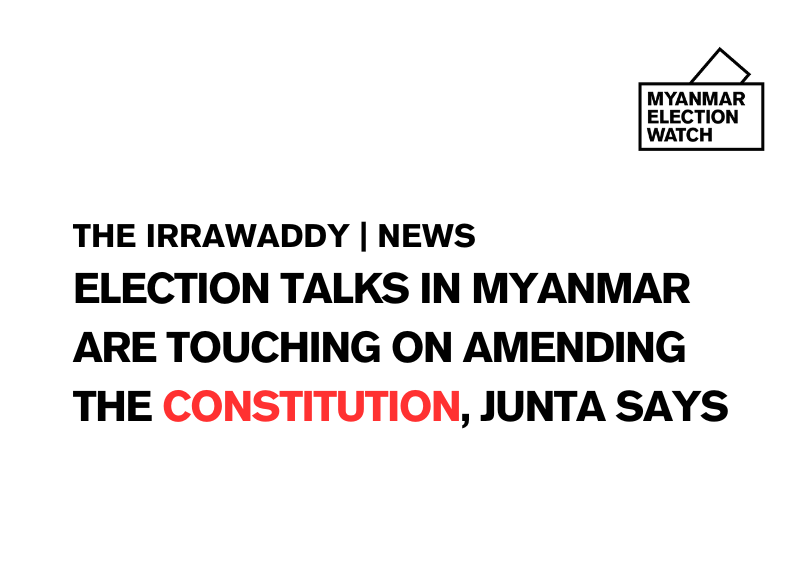The junta’s peace negotiators met representatives of four still-legal political parties in Naypyitaw this week to discuss a post-coup election, just one week after coup-leader Min Aung Hlaing promised to deliver one sometime next year.

The Irrawaddy's Original Reporting here.
The meeting took place on Wednesday and Thursday in Naypyitaw as junta airstrikes continued to reduce the number of potential voters.
The meeting touched on a hotly contested topic: amending the military drafted constitution of 2008, junta media reported.
The two-day meeting saw the National Solidarity and Peace Negotiation Committee talk about things like the constitution with representatives of a political parties working group that excludes the country’s most popular political party. The committee was set up by the junta to deal with ethnic armed organizations and the political parties it had not yet banned.
The working group of political parties is led by four of them, including the military’s proxy, the Union Solidarity and Development Party. The Shan and Nationalities Democratic Party, which added the “and” to its name last year to register with the junta’s election body for the proposed election, is also a member, as are the People’s Party and the Arakan Front Party. What all four have in common is a lack of popular support.
The four parties represent 47 political parties registered with the junta’s Union Election Committee.
Junta peace committee chair Lieutenant-General Tun Tun Naung, who is also the junta’s border affairs minister, was the highest ranking military officer at the meeting. The committee’s member, U Hla Maung Shwe, also attended. He has been part of the military’s failed peace process since Thein Sein’s quasi-civilian government.
The junta representatives were joined by Dr. Aung Myat Oo, a high-ranking member of the military’s proxy party, veteran 1988 Generation democracy activist U Ko Ko Gyi – in his new guise as leader of the People’s Party – Shan and Nationalities Democratic Party chair Sai Ai Pao and Arakan Front Party chair Dr. Aye Maung.
Dr. Aung Myat Oo took the lead on behalf of the political parties working with the junta.
Lt-Gen Win Bo Shein, a member of the junta’s peace committee, debuted agreements on peace and development and proposed amendments to the military-drafted 2008 constitution on the first day of the meeting.
Junta peace negotiators and representatives of the political parties that work with it discussed the proposed amendments, junta media reported.
Things really took off on the second day, junta media reported, suggesting that participants rolled up their sleeves to focus on the nitty gritty of building a union based on democracy and federalism.
U Ko Ko Gyi told The Irrawaddy that even though it is unknown when the election will be held, it is necessary for political parties planning to participate in it to discuss proposals to amend the constitution with the junta so that agreements can be reached by both sides to prevent conflicts from erupting like they have in the past.
The ousted government of the since-banned National League for Democracy (NLD) pushed for constitutional amendments that would end the military’s control over politics and remove privileges granted by the charter to the military in the legislative, administrative and judicial branches of government.
This failed when the military and its proxy party blocked the amendments in parliament in 2020.
The military staged a coup the following year, overthrowing the NLD government and annulling the results of the 2020 general election that would have seen the NLD govern for a second term.
U Ko Ko Gyi has a good feeling about the two-day meeting, saying: “We were tense on the first day, but later on we got a chance to learn each other’s feelings. And we discussed proposals for constitutional amendments … On the second day, the meeting even lasted till 8:30 pm.”
“I believe that a path toward change is beginning to open up,” he said.
He declined, however, to disclose the details of proposals to amend the military-drafted constitution by political parties or the junta’s peace negotiators.
Junta propagandists have been enthusiastic about Myanmar’s future. They say the regime, ethnic armed organizations that signed the National Ceasefire Agreement and political parties will reach consensus on constitutional amendments ahead of the planned election next year, and the amendments will be shepherded through parliament and signed into law by the next government.
